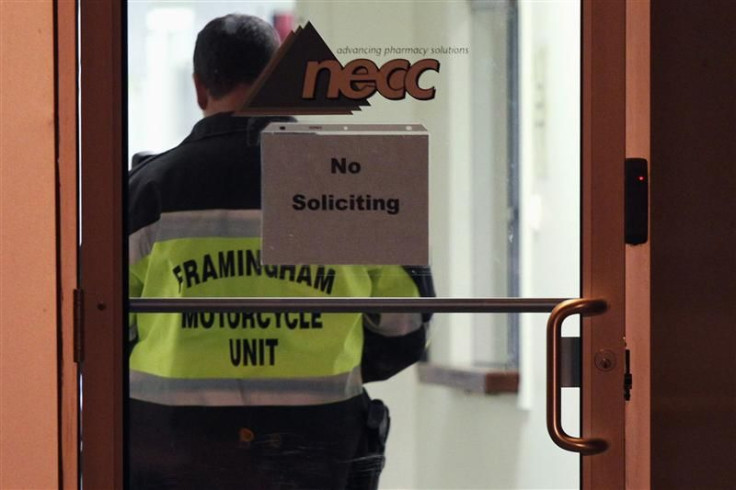Feds Raid Massachusetts Lab Tied to Meningitis Outbreak

Federal agents on Tuesday raided the Massachusetts pharmacy linked to a meningitis outbreak that has killed 15 people and sickened more than 200 others, federal prosecutors said.
Agents from the U.S. Food and Drug Administration searched the New England Compounding Center (NECC) in the Boston suburb of Framingham, with officers from the local police department on site providing support, Framingham police said.
Carmen Ortiz, U.S. Attorney for Massachusetts, said: "I can confirm that this office and our law enforcement partners are investigating allegations concerning the New England Compounding Center."
Ortiz cautioned it was "entirely premature" to speculate about what might be uncovered.
Officials from NECC did not immediately respond to phone calls or emails seeking comment.
The raid came as a leading U.S. lawmaker called for an investigation of whether NECC violated federal laws covering potentially addictive drugs, a day after the health scare widened to new medications.
The U.S. meningitis outbreak continues to grow and has so far killed 15 people and infected 231, according to a tally from the Centers for Disease Control and Prevention on Tuesday.
"We will see more patients reporting in ill and we'll have to treat many more," Dr. William Schaffner, an infectious diseases expert at the Vanderbilt University Medical Center in Nashville, said on "CBS This Morning."
The FDA on Monday widened its investigation of the cause of the fungal meningitis outbreak to other drugs made by the NECC.
Nearly 14,000 people nationwide are at risk of infection because they received injections from suspect steroid medications shipped to 76 facilities in 23 states.
Another 19 people were reported stricken with fungal meningitis on Tuesday. The 231 total does not include two people who have a non-meningitis fungal infection from injections in their joints (as opposed to back injections), so the total of infections reached 233.
In Washington, Massachusetts Democratic Congressman Edward Markey, a senior member of the committee that oversees business, called on the Justice Department to investigate whether NECC violated federal laws designed to stem illegal activity in controlled drugs.
The NECC already faces multiple investigations by the FDA and several states, but Markey's request could launch an even more serious probe involving the Drug Enforcement Agency, which oversees sales of potentially addictive, or "controlled," drugs.
'CAN'T ASSURE THE STERILITY'
The FDA said Monday it was looking into two other drugs made by the NECC.
The agency said it had received reports of a patient with possible meningitis who received an injection of a different steroid than the one found to have caused the deaths. It said Tuesday that one transplant patient was infected with a fungus after receiving a drug used in open heart surgery made by NECC. The FDA had originally said two such patients were infected.
Another patient identified by the FDA received an injection of the steroid triamcinolone, also supplied by NECC.
During a conference call on Tuesday with doctors on the meningitis outbreak, FDA official Janet Woodcock stressed that the two additional products had not been linked to confirmed infections. She asked doctors to contact patients injected since May to make sure they have no signs of infection.
NECC said in a statement that it was reviewing the new information from the FDA.
The FDA has been inspecting the NECC facilities. Woodcock said that based on the condition of the plant and other factors, "we really can't assure the sterility of these products."
The legal threat to NECC also mounted as more victims of meningitis filed lawsuits.
Lyn Laperriere, who remains in hospital with fungal meningitis, filed a federal lawsuit in Michigan on Tuesday. The lawsuit says he received an epidural injection of methylprednisolone acetate manufactured by NECC on September 6 and shortly afterward showed symptoms of fever, headache, stiff neck, nausea and vomiting as well as light sensitivity.
Laperriere went to a hospital in Ypsilanti, Michigan, where he was admitted and began treatment first for bacterial meningitis which proved ineffective, the lawsuit states. He was later diagnosed with fungal meningitis.
Brenda Bansale of Howell, Michigan, who also is hospitalized for fungal meningitis, filed a federal lawsuit in Detroit on Monday that contends she was injected on August 28 and developed severe headaches and nausea on October 4.
All but eight of the 23 states that received suspect medications from the Massachusetts specialist pharmacy have reported at least one case of fungal meningitis.
Meningitis is an infection of the membranes covering the brain and spinal cord. Symptoms include headache, fever and nausea. Fungal meningitis is not contagious.
The outbreak has raised questions about how the pharmaceuticals industry operates. NECC engaged in a practice called drug compounding that is not regulated by the FDA, which generally oversees drug makers.
In compounding, pharmacies prepare specific doses of approved medications, based on guidance from a doctor, to meet an individual patient's need.
A Reuters investigation found that NECC solicited bulk orders from physicians and failed to require proof of individual patient prescriptions as required under state regulations, emails to a customer showed.
State pharmacy regulators have said that NECC violated its license in Massachusetts by not requiring patient prescriptions before shipping products.
The 15 states reporting cases of meningitis are Tennessee, Michigan, Pennsylvania, New Hampshire, Illinois, Indiana, Minnesota, New Jersey, Texas, Idaho, Maryland, North Carolina, Virginia, Ohio and Florida.



























